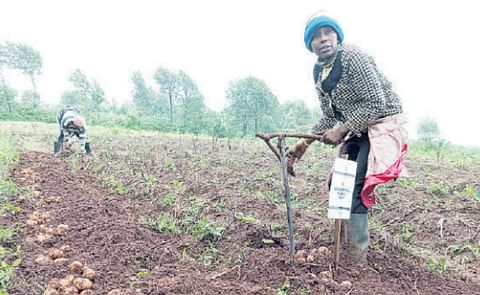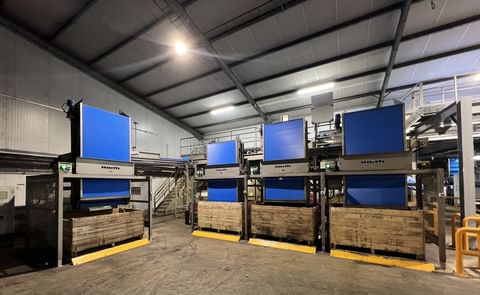Planting Update May 28, 2020
Canadian Potato Crop Update May 28 2020

Many Canadian Potato growers have been dealing with a difficult two months with an unexpected supply of processing potatoes as a result of decreased sales of French fries, as sit-down restaurants shut down during the COVID-19 pandemic.
Growers always look forward to getting into the field and planting a 'new' crop. Fortunately for most areas, planting conditions have been very good, allowing growers to get their 2020 crop into the ground in a timely manner. Here is a snapshot of progress to date:
Prince Edward Island:
As of today, planting on PEI is around 70% complete with very good conditions and no rain delays over the past ten days. Some growers will finish up this week and soil conditions are now getting dry.
Processing acres in the province are expected to be down 10% below last year. Chip acres will be up slightly, and little change is expected in fresh or seed acres. PEI planted 85,500 acres last year. Potatoes from the old crop continue to go to the intended markets.
There will be significant unused seed as a result of lower processing acres. The surplus seed will be diverted to fresh markets, dehy, cattle feed, or waste. Old crop potatoes will likely be processed into September.
New Brunswick:
Planting is around 80% complete with most farmers hoping to finish this week. The soil was cooler earlier on but has warmed up now and is quite dry. Rain would be welcomed later this week.
Based on extra seed that has recently become available, there have been some acreage reductions, although it is still uncertain if all growers cut back to their volume reductions. Growers planted 52,900 acres last year.
The old crop is moving slowly, and the excess seed is now adding to the pile. As a result, the old crop may not clean up until well into October and there are also some potatoes that may not make it into the table market.
Orders for more French fries seem to be coming back, as processing plants begin to start ramping up again in reaction to people wanting to go out and eat again and try to return to their consumer buying habits.
Nova Scotia:
Some of the first potatoes were planted on April 6th are now enjoying good growing conditions. Planting season was normal with not much change expected from the 1,600 aces planted in NS last year.
Quebec:
Planting is about 75%-80% complete with excellent soil and temperature conditions this year. There were no delays due to rain and resulting soil conditions are dry. Fresh acres are expected to increase by 1,500 acres and processing acres are expected to decrease by 860 acres (-12%) this year.
Much of the seed volume in the province was already sold and delivered before the processing cuts were made. The biggest processor in the province will be able to use all of the remaining old crop volumes but will need to run later into the season in order to be able to do it.
Therefore, contracts for next year are reduced by 12%. It is still uncertain whether the fresh-cut processors will be able to use all of their old crops, but the Quebec industry is optimistic they will be able to move all of their potatoes this year.
The old crop will likely run until Labor Day. Quebec producers are not concerned about using up this year’s crop because the province was short of potatoes from the start. However, they will be taking a close look at volume after the new crop is harvested in the fall.
Ontario:
Planting is about 85%-90% complete and growers should finish up by early next week. Soil temperatures have been ideal for planting. There were above-average air temperatures this week, but the province also received adequate precipitation to mitigate that effect.
Acreage is expected to be stable, around last year’s 34,000 acres, as they have not seen any contract volume reductions. Demand for chips has been good so old crop chip stock will clean up earlier than normal.
The fresh crop looks to be on track for comparable years. The old crop should run until the first week of July.
Manitoba Processing:
Planting is about 97% complete, which would be 7 to 10 days later than normal. Planting conditions in Manitoba were wet and cold this spring, although the weather did turn warmer two weeks ago. Some of the earlier fields planted on April 18 are now at a ground crack.
It is still early to determine acreage changes but suggests the acreage may be down by 2,000 acres due to an initial 16% cut by McCain Foods (3% was returned during planting).
J.R. Simplot was down 9% of intended planting, (leaving some seed long), but then offered 6% back during planting. Simplot’s overall volume compared to last year will be up slightly. Old crop movement through McCain Foods has dropped 75% over the last month, but they are looking to bring people back to work in the next few days and begin production again.
The Simplot factory has been running fairly steady hoping to add a few days run time if they can secure the additional quality product. Old crop in the province will likely run to August 31st.
Manitoba Fresh:
Planting is around 85% complete. Conditions were wet and cold at the start which delayed planting for about ten days, however, conditions are perfect now. Fresh acreage will be similar to last year.
Whites up a little (150 acres), russets down, yellows up a little, and reds down. The table crop is expected to clean up by early July.
Saskatchewan:
Growers were delayed starting to plant due a cold spring with frost at nights up to mid -May. A lot of growers started planting around May 15th and progress has been good with about 75% planted. Most growers expect to finish within the next ten days.
Last year Saskatchewan planted 6,300 acres. Seed acreage is expected to be similar this year with a couple of new entrants starting into the fresh sector.
Alberta:
The southern part of the province, where most of the processing is grown, finished planting two weeks ago. The earlier fields have emerged and look good. Seed growers in the northern part of the province are finishing up this week.
Temperature and soil conditions have been excellent with the province receiving 1.5-4 inches of rain last week, getting the crop off to a great start. Processing acres in Alberta are down about 10,000 acres this year. Fresh acres are up slightly.
Seed acreage is unknown at this time after many growers had orders from their processing customers in the US and Canada canceled this spring. Last year Alberta planted 61,235 acres of potatoes.
Old crop processing inventory continues to be a drag on the industry as reduced demand for French fries during COVID-19 has created plant shutdowns and lay-offs throughout the spring. Alberta hopes to have an old crop cleaned up by the third week of August.
British Columbia:
Planting conditions have been good in BC with almost all of the planting now done. Planted acres are expected to be similar to last year’s 6,700 acres. Kennebec, a popular variety used for French fries in the local restaurants may see a slight decline this year.
The first early Warba’s were planted on February 28th so they will soon be coming to the marketplace and real digging will begin in early June.
Unfortunately, due to COVID-19 restrictions, the Crop Transition Conference, which provides a good snapshot of the transition schedule from the old crop into a new crop, will not be held physically this year in Minneapolis. Instead, it will be conducted virtually on Go to Meeting on Friday, June 19th, beginning at 11:00 AST.











